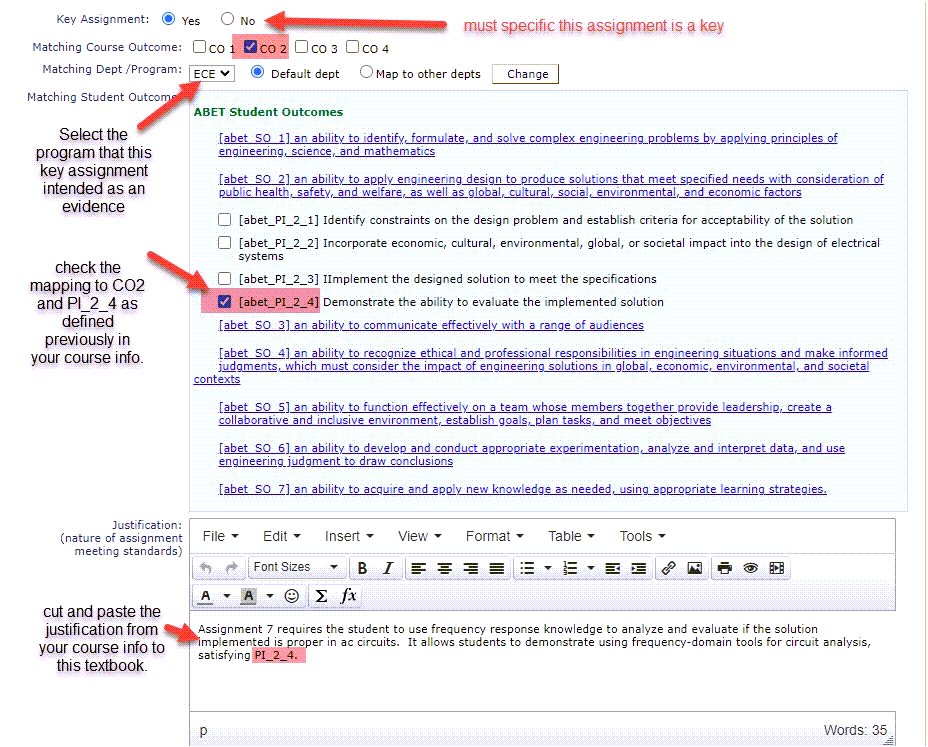FCAR
- Reflection on Teaching Delivery
- Summative Evaluation on Teaching
- Formative Evaluation on Teaching
- Course Outcomes/Performance Indicator Assessment
Why We Adopt FCAR
Dr. John Estell first created FCAR in 2001. FCAR allows instructors to write assessment reports in a concise, standardized format conducive for use in both course and student outcomes assessments. The FCAR provides one or two pages of summative information related to the courses taught by each faculty member during that semester. The FCAR generally contains the following information:
- Course Description
- Course Outcomes
- Class Grade Distribution
- Course Outcomes Assessment
- Student Outcomes Assessment
- Reflection
- Proposed Action Items
The main idea is to capture the reflection and proposed action items for improvement of courses taught at the grass-roots by the responsible instructors. Hence, the assessment information is processed by the instructor who is most closely associated with the data so that any observed difficulties or extenuating circumstances affecting performance can be readily documented as part of the FCAR.
FCAR Assessment Model
FCAR Planning-Teaching-Evaluation Process
How to Implement FCAR
The goals for meaningful course assessment are to
- teach topics aligned with the student outcomes
- ensure the right level of challenge
- focus teaching based on the teaching needs of each student
- implement instructional strategies to increase student achievement
For any given course, the process of achieving these goals always involves planning for the course, conducting teaching and learning, and evaluating the effectiveness of teaching and learning. The process for individual course assessment or program evaluation is always time-consuming. This is particularly true if the results collected from each course are in different formats. Hence, it is imperative to provide a workable framework for individual faculty members to follow in order to achieve uniform data collection and relevant information presentation
Learning Plan
EvalTools® provides consistent interfaces to capture the learning plan and activities for the semester. More than a class syllabus, the learning plan also allows you to enter course outcomes and assessment anchors as well as typical information such as course descriptions, course outlines, textbooks, grading policies, etc. Material entered here is available to students, teachers, principals or the curriculum director to review throughout the semester. Additionally, course outcomes entered here will be used across all the modules for outcomes assessment.
EvalTools provides a framework for consistent teaching planning to align with the course outcomes and program assessment.
Criteria Mapping Process
Teaching: Building Course Portfolio
Faculty only needs to map a key assignment to Course Outcome or Student Outcomes.

Teaching: Building Course Portfolio
Each faculty member is responsible for producing a course portfolio as part of the assessment process. The course portfolio contains students' key assignments to directly assess their attainment of course outcomes, which correlate to student outcomes.
It is worth pointing out that EvalTools does not examine Student Portfolios for direct assessment. A Student Portfolio contains information that students see fit for their professional development, which may or may not align with the student outcomes EvalTools targets to measure. Hence, EvalTools focuses only on the student work collected in class on what the faculty member wants to measure.
Once a key assignment is graded, the grades are submitted to EvalTools®. EvalTools® then produces the necessary EMAU vectors for each key assignment and their mapping to either the course outcome or the student outcome in FCAR.
EvalTools® provides the necessary objective evidence folder electronically at the end of the semester. As a result, the faculty workload is much simplified.
Evaluation: FCAR
FCAR is a unique feature of EvalTools®. The FCAR gives faculty a chance to look at his or her teaching at the end of the semester to evaluate performance.
With FCAR, faculty can review action items that pertain to the faculty's course for closure and write a brief "reflection" on his or her course. More importantly, the FCAR compiles performance vectors for the faculty's key assignments. The performance vectors are color-coded to give faculty a visual impression of how well he or she has delivered each topic in the course (summative assessment). Faculty could even review and analyze the performance vectors during teaching to get just-in-time feedback from the class to help improve teaching (formative assessment).
Part of FCAR
Don't Miss Any Opportunity
Contact us anytime.

Keep In Touch
